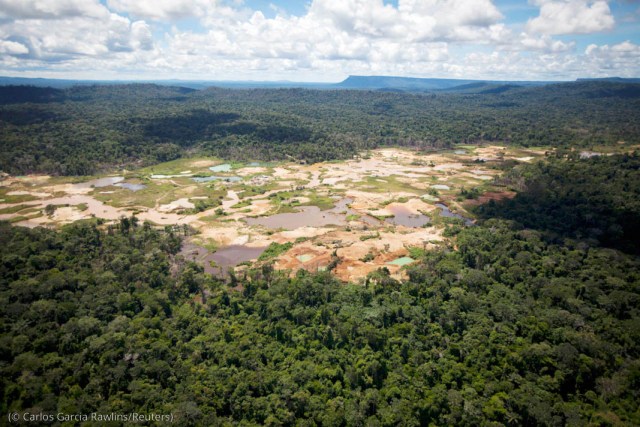
Gold mining in Venezuela has been tied to human rights abuses for years. New reports detail how the practice is also destroying the environment.
By Share América – Noelani Kirschner
Jan 5, 2023
Venezuela is home to 8% of the entire Amazon rainforest, which absorbs millions of tons of carbon dioxide each year. Rainforest spans roughly 60% of the southern part of the country.
However, this same region of Venezuela, Amazonas, is also the location of extensive illegal gold mining.
Between 2016 and 2021, approximately 1.4 million hectares of the rainforest disappeared, in large part because of the state-run Orinoco Mining Arc’s extraction of gold, diamonds and other precious materials.
Of particular concern are new reports from U.S. and Venezuelan nongovernmental organizations showing Venezuela’s government-run mining operations in Venezuela’s Yapacana National Park are stripping the mountain.
Yapacana National Park is supposed to be protected against mining by the country’s government. But with satellite imagery, SOS Orinoco in Caracas and the Amazon Conservation Association in Washington have exposed 8,000 mining camps or pieces of machinery in Yapacana National Park and 425 more camps or pieces of machinery at the top of Cerro Yapacana, a mountain within the park that is sacred to Indigenous communities.
“They’ve turned the mountain into sand,” a former miner told the Washington Post. “A tree will never be able to grow there.”
In addition to its trees, the mountain is home to endangered species and rare flora, which experts say are probably lost forever.
Harm to Indigenous communities
Twenty-two ethnic Indigenous tribes have called the Amazonas home for millennia.
Human rights abuses have been common in the Orinoco Mining Arc since 2016, where Indigenous men have been forced to work against their will and illegal mining operations have contaminated local water supplies.
In July 2022, an activist group reported that Virgilio Trujillo Arana, an Indigenous Uwottuja man, was shot in the Amazonas state capital. Arana was known to oppose the armed groups who control the illegal mining operations and to advocate for the preservation of the Amazon rainforest in Venezuela.
“The presence of armed non-state actors and criminal groups has increased violence, especially along the border with Colombia; in mining regions; and in urban centres,” said U.N. High Commissioner for Human Rights Michelle Bachelet in March 2022. “I call on the authorities to investigate all allegations of human rights violations and abuses, with special attention to the rights of indigenous peoples.”
…
Read More: Share América – How ‘blood gold’ damages the Amazon rainforest in Venezuela
…

